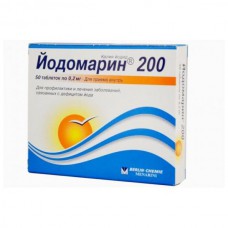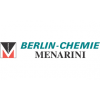Expiration date: 06/2026
The composition and form of issue:
Iodomarin 100
Tablets. 1 tablet contains potassium iodide 131 mcg
(corresponding to 100 µg of iodine)
excipients: lactose monohydrate magnesium carbonate basic light gelatin carboximetilkrahmal the sodium salt of silicon dvuoksid widedispersive magnesium stearate
in glass bottles of 50 or 100 pieces in a cardboard box 1 vial.
Iodomarin 200
Tablets. 1 tablet contains potassium iodide 262 mcg
(equivalent to 200 mcg of iodine)
excipients: lactose monohydrate magnesium carbonate basic light gelatin carboximetilkrahmal the sodium salt of silicon dvuoksid widedispersive magnesium stearate
in a contour cells packing 25 PCs in a cardboard box 2 or 4 packs.
Description pharmaceutical form:
Flat on both sides pill white, or almost white, with a unilateral notch for the division.
Feature:
The preparation of inorganic iodine.
Pharmacological action:
Prevents the development of deficiency States regulate the function of the thyroid gland, which was interrupted by iodine deficiency.
Description pharmacological action:
Iodine contributes to the normal activities of the thyroid gland, the hormones which provide proper metabolism in the body, regulate the brain, nervous and cardiovascular systems, genital and mammary glands, growth and development of the child.
Indications:
Prevention of iodine deficiency diseases in the areas with iodine deficiency, primarily in children, adolescents, pregnant and lactating women, the treatment of diffuse non-toxic and euthyroid goitre in children (including newborns and teenagers) and adults.
Contraindications:
Hypersensitivity to iodine, hyperthyroidism, toxic thyroid adenoma, nodular goiter at doses of 300-1000 mg/day (with the exception of preoperative logotherapie), herpetiformis (senile) dermatitis during.
Application of pregnancy and breast-feeding:
Pregnancy and breast-feeding should be used in doses of 200 mg/day.
Side effects:
For prophylactic use at any age, as well as therapeutic application in infants, children and adolescents side effects, as a rule, is not observed. In rare cases, continuous administration of the drug can lead to "iodism", which may occur a metallic taste in the mouth, swelling and inflammation of the mucous membranes (rhinitis, conjunctivitis, bronchitis), "fever iodine", "iodine acne". Very rare angioedema, exfoliative dermatitis. In applying the drug in a dose of 150 mg/day, latent hyperthyroidism can go into manifestou form. In the application of doses of 300 to 1000 mg/day may develop hyperthyroidism (especially in elderly patients suffering from goiter for a long period, the presence of nodular or diffuse toxic goiter).
Drug interactions:
May strengthen or weaken the effect and development of side effects when combined with lithium salts, potassium-sparing diuretics and substances that inhibit the formation of thyroid hormones.
Method of application and dose:
Inside, after eating, squeezed enough liquid. To prevent goitre: adults and teenagers — 100-200 mg/day infants and children — 50-100 mg/day during pregnancy and breast feeding — 200 mcg/day.
Prevention of recurrence of goitre after surgery goiter or after medical treatment of goiter drugs thyroid hormones: 100-200 mcg/day.
Prophylactic administration of the preparation should be carried out for several years, often lifelong.
Treatment of goitre: adults up to 45 years — 300-500 mg/day to infants, children and adolescents 100-200 mg/day course of treatment in neonates is 2-4 weeks in children, Teens and adults — 6-12 months or more (by the doctor).




